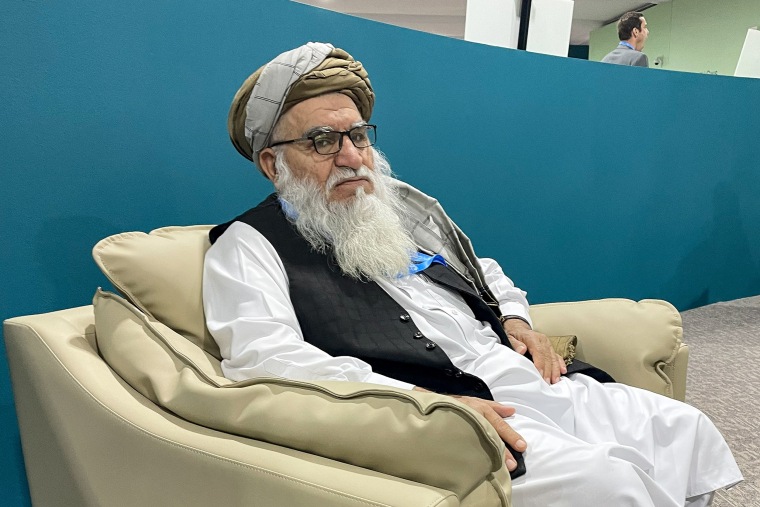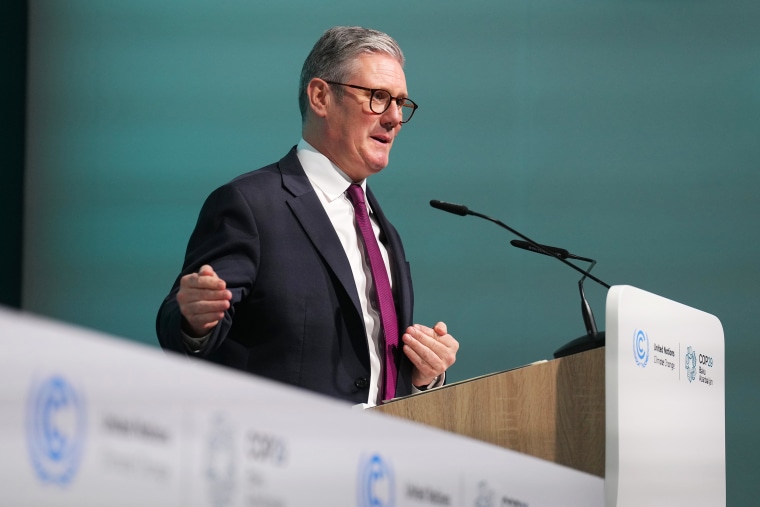BAKU, Azerbaijan — Ambitious climate action often requires ambitious financing — be it a clean energy transition project or helping developing countries mitigate the effects of natural disasters.
But as extreme weather becomes more the norm and temperatures rise across the planet, what is supposed to be a critical year for funding mitigation efforts has instead turned out to be an especially frustrating one.
Nearly 50,000 people from 200 countries — including, for the first time, the Taliban rulers of Afghanistan — were in Azerbaijan for this year’s United Nations Climate Change Conference, with the goal of reaching a critical deal on climate finance. The conference was set to end Friday but negotiations over funding extended into the weekend.
The conference, known as COP29,
A draft of a deal to help the world adapt to and deal with climate change released at the conference, known as COP29, pledged $250 billion annually by 2035 from wealthy countries to poorer ones. While rich nations say it’s realistic and about the limit of what they can do, it is less than a quarter of the number requested by developing nations struck hardest by extreme weather.
The conference was already shadowed by the victory of President-elect Donald Trump, who withdrew the United States from the Paris Agreement climate change treaty the first time he was president and has vowed to do so again. The atmosphere had already been dampened by poor attendance by world leaders, particularly from wealthy nations.
Developing countries are seeking $1 trillion a year by the end of the decade, much of it from developed economies, to transition to green energy and adapt to extreme weather driven by climate change. A deal looks unlikely after a draft text released Thursday was short on details, using a placeholder “X” instead of specifying who should pay and how much.
As the World Meteorological Organization says 2024 is on track to be the hottest year on record, some experts are so worried they are calling for a completely new approach. In an open letter published last week, signatories including former U.N. Secretary General Ban Ki-moon said the whole framework of U.N. climate talks is “no longer fit for purpose.”
“We can choose to be proactive about climate, and the time for being proactive is rapidly shrinking,” said Ruth Townend, a senior research fellow at the London-based think tank Chatham House who attended the conference. “Or we can choose to be reactive, which is much more expensive, much harder and has a higher human cost.”
Some of the highest human costs will be paid by smaller nations that are disproportionately affected by climate change, including Pacific Island nations whose existence is threatened by rising seas. But with COP29 weighed down by geopolitics and domestic turmoil, some were reluctant to attend at all.
Deepening divides
Top leaders from a number of major economies were notably absent in Baku, the capital of Azerbaijan.
They included President Joe Biden and Chinese President Xi Jinping, leader of the two biggest carbon emitters. Though British Prime Minister Keir Starmer did attend, most other leaders of the Group of Seven leading industrialized countries did not, including French President Emmanuel Macron, German Chancellor Olaf Scholz, Canadian Prime Minister Justin Trudeau and Japanese Prime Minister Shigeru Ishiba.
While the bulk of the work happens among lower-level negotiators during long nights in windowless rooms, the presence of heads of state “are about symbolism,” Townend said.
“It is really disappointing to see that world leaders haven’t shown up in force in solidarity,” she added.
Despite his physical absence, one person whose presence has been felt here is Trump.

U.S. officials have sought to reassure conference attendees after Trump’s victory.
While Trump “may put climate action on the back burner,” U.S. climate envoy John Podesta said, “the work to contain climate change is going to continue.”
U.S. Energy Secretary Jennifer Granholm said states, cities, nongovernmental organizations and companies are still “all-in” on pursuing climate goals. She also noted that 80% of the funding from Biden’s two signature bills, the Inflation Reduction Act and the Bipartisan Infrastructure Law, has gone to Republican districts including to promote the manufacturing of electric vehicles, wind turbines and solar panels.
She said Trump could slow, but not stop, U.S. climate efforts.
“It would be political malpractice to undo those opportunities when people are just now getting hired,” Granholm told NBC News. Some 400,000 people have been hired because of the bills, she added.
Even companies that stand to benefit from Trump’s pledge to loosen restrictions on oil and gas exploration have expressed concern. Darren Woods, chief executive of Exxon, said he hoped the Trump administration would take a “common sense approach” to reducing emissions and remain in the Paris Agreement.
Meeting the goals under the agreement, which include keeping global warming to 1.5 degrees Celsius (2.7 degrees Fahrenheit) over pre-industrial temperatures, could cost as much as $8 trillion annually, according to a report released last week by the Independent High Level Expert Group on Climate Finance.
Who foots the bill?
Nations that are highly affected by climate change despite being relatively small emitters themselves have grown frustrated with major polluting countries they see as shirking responsibility for helping them cover the costs and trying to hold back their development in the name of environmental protection.
The host of the conference, Azerbaijan President Ilham Aliyev, struck a tone of defiance in his keynote address, saying countries like his should not be castigated for exporting fossil fuels, especially by the U.S. and other wealthy nations that continue to rely on them.

Aliyev and others whose countries have developed more recently, many of which were colonized by the West, say they should not be punished economically for the past emissions of wealthier nations.
“Who created this pollution that we have? It’s 120 years of industrial revolution,” Saudi Arabia’s climate envoy, Adel Al-Jubeir, said.
Lord Adair Turner of Britain, who chairs a global coalition known as the Energy Transitions Commission, said the Saudi climate envoy was living in a “diplomatic fantasy land.”
“For Saudi Arabia to say — with its level of per capita income — that it’s a developing country is an insult to true developing countries like in sub-Saharan Africa,” he said in an interview. “We are going to have to have financial flows not just from rich developed countries in the classic sense in the G7, but also from the rich countries of the Middle East and indeed also from China.”
Though China industrialized later than many of the world’s biggest polluters, analysts from the U.K.-based Carbon Brief said during the conference that China had surpassed the European Union as the world’s second-biggest historical emitter after the United States.
The infighting has only further exasperated Pacific Island nations such as Papua New Guinea, whose Prime Minister James Marape said in August that it would boycott the Baku conference as “a protest at the big nations” that continue emitting while balking at paying.
Marape did eventually send a delegation under pressure from activists.
Even as many world leaders skipped the conference or tried to, it also had first-time attendees from Taliban-led Afghanistan. Though the Taliban have struggled to gain international recognition over their rollback of women’s rights and other abuses, Afghanistan is one of the countries most vulnerable to climate change.
The agriculture-reliant country has been pushed into a “peril position,” said Asadullah Jawid, an assistant professor at the American University of Afghanistan who has studied the effects of climate change on the country’s farmers.
“Decades of war and instability, economic challenges, devastated infrastructure and an impoverished workforce have left Afghanistan with few resources for climate adaptation initiatives,” he said.

